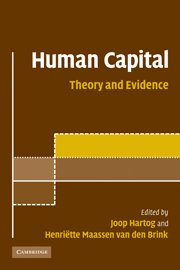Book contents
- Frontmatter
- Contents
- List of figures
- List of tables
- Notes on contributors
- Prologue
- Part I Measuring the benefits from human capital
- Part II Applying and extending the human capital model
- Part III Policy interventions
- 10 Using (quasi-)experiments to evaluate education interventions
- 11 Unemployment duration: policies to prevent human capital depreciation
- 12 Can We stimulate teachers to enhance quality?
- 13 Optimal tax and education policies and investments in human capital
- Epilogue: some reflections on educational policies
- A note on econometrics
- Index
- References
10 - Using (quasi-)experiments to evaluate education interventions
Published online by Cambridge University Press: 22 September 2009
- Frontmatter
- Contents
- List of figures
- List of tables
- Notes on contributors
- Prologue
- Part I Measuring the benefits from human capital
- Part II Applying and extending the human capital model
- Part III Policy interventions
- 10 Using (quasi-)experiments to evaluate education interventions
- 11 Unemployment duration: policies to prevent human capital depreciation
- 12 Can We stimulate teachers to enhance quality?
- 13 Optimal tax and education policies and investments in human capital
- Epilogue: some reflections on educational policies
- A note on econometrics
- Index
- References
Summary
‘… Can you name the two forces underlying all life in this world?’
‘Uh – wealth and poverty?’
‘Not wealth and poverty.’
‘Good and evil?’
‘No – cause and effect….’
From Vernon God Little by D. B. C. Pierre (2003)Introduction
The key question in any evaluation study is how to assess what would have happened in the absence of the policy that is investigated. Simply comparing the average outcomes for participants and non-participants will in general provide an incorrect estimate of the policy's effect. Correcting the estimates for differences in observed characteristics, as is done in a regression framework or with matching methods, may solve the problem partially but not entirely.
Consider the following three examples. First, when we are interested in the effect of class size reduction on pupils’ achievement, we might want to compare the average achievement of pupils who attend small classes with the average achievement of pupils who attend large classes. But if we do that in the Dutch context we are basically comparing pupils from disadvantaged backgrounds (who are typically placed in small classes to compensate for their disadvantage) with non-disadvantaged pupils. We therefore need to control for social background. But even if we do so, some parents may want to have their children placed in small classes while others do not care.
- Type
- Chapter
- Information
- Human CapitalAdvances in Theory and Evidence, pp. 155 - 169Publisher: Cambridge University PressPrint publication year: 2007



